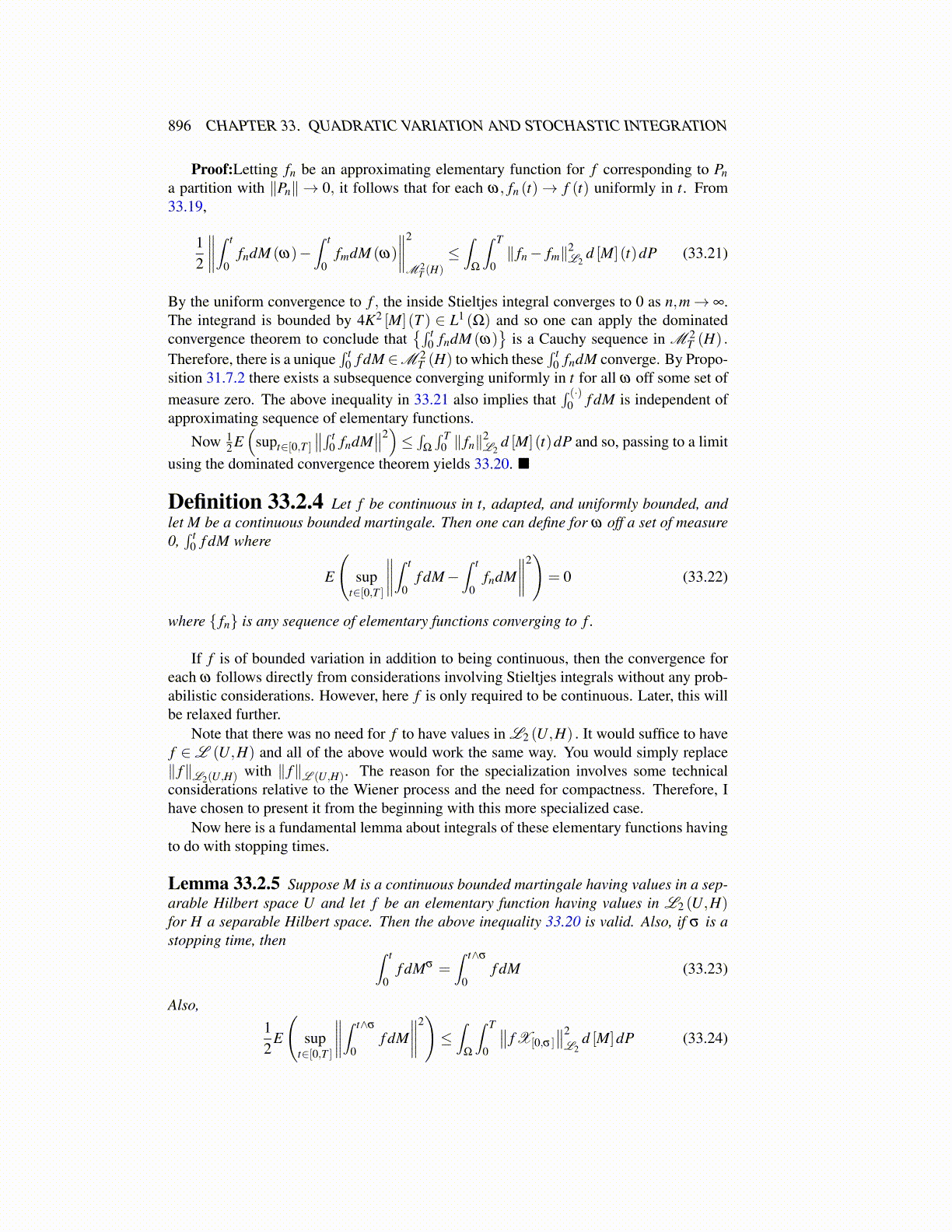
896 CHAPTER 33. QUADRATIC VARIATION AND STOCHASTIC INTEGRATION
Proof:Letting fn be an approximating elementary function for f corresponding to Pna partition with ∥Pn∥ → 0, it follows that for each ω, fn (t)→ f (t) uniformly in t. From33.19,
12
∥∥∥∥∫ t
0fndM (ω)−
∫ t
0fmdM (ω)
∥∥∥∥2
M 2T (H)
≤∫
Ω
∫ T
0∥ fn− fm∥2
L2d [M] (t)dP (33.21)
By the uniform convergence to f , the inside Stieltjes integral converges to 0 as n,m→ ∞.The integrand is bounded by 4K2 [M] (T ) ∈ L1 (Ω) and so one can apply the dominatedconvergence theorem to conclude that
{∫ t0 fndM (ω)
}is a Cauchy sequence in M 2
T (H) .
Therefore, there is a unique∫ t
0 f dM ∈M 2T (H) to which these
∫ t0 fndM converge. By Propo-
sition 31.7.2 there exists a subsequence converging uniformly in t for all ω off some set ofmeasure zero. The above inequality in 33.21 also implies that
∫ (·)0 f dM is independent of
approximating sequence of elementary functions.
Now 12 E(
supt∈[0,T ]∥∥∫ t
0 fndM∥∥2)≤∫
Ω
∫ T0 ∥ fn∥2
L2d [M] (t)dP and so, passing to a limit
using the dominated convergence theorem yields 33.20. ■
Definition 33.2.4 Let f be continuous in t, adapted, and uniformly bounded, andlet M be a continuous bounded martingale. Then one can define for ω off a set of measure0,∫ t
0 f dM where
E
(sup
t∈[0,T ]
∥∥∥∥∫ t
0f dM−
∫ t
0fndM
∥∥∥∥2)
= 0 (33.22)
where { fn} is any sequence of elementary functions converging to f .
If f is of bounded variation in addition to being continuous, then the convergence foreach ω follows directly from considerations involving Stieltjes integrals without any prob-abilistic considerations. However, here f is only required to be continuous. Later, this willbe relaxed further.
Note that there was no need for f to have values in L2 (U,H) . It would suffice to havef ∈L (U,H) and all of the above would work the same way. You would simply replace∥ f∥L2(U,H) with ∥ f∥L (U,H). The reason for the specialization involves some technicalconsiderations relative to the Wiener process and the need for compactness. Therefore, Ihave chosen to present it from the beginning with this more specialized case.
Now here is a fundamental lemma about integrals of these elementary functions havingto do with stopping times.
Lemma 33.2.5 Suppose M is a continuous bounded martingale having values in a sep-arable Hilbert space U and let f be an elementary function having values in L2 (U,H)for H a separable Hilbert space. Then the above inequality 33.20 is valid. Also, if σ is astopping time, then ∫ t
0f dMσ =
∫ t∧σ
0f dM (33.23)
Also,12
E
(sup
t∈[0,T ]
∥∥∥∥∫ t∧σ
0f dM
∥∥∥∥2)≤∫
Ω
∫ T
0
∥∥ f X[0,σ ]
∥∥2L2
d [M]dP (33.24)